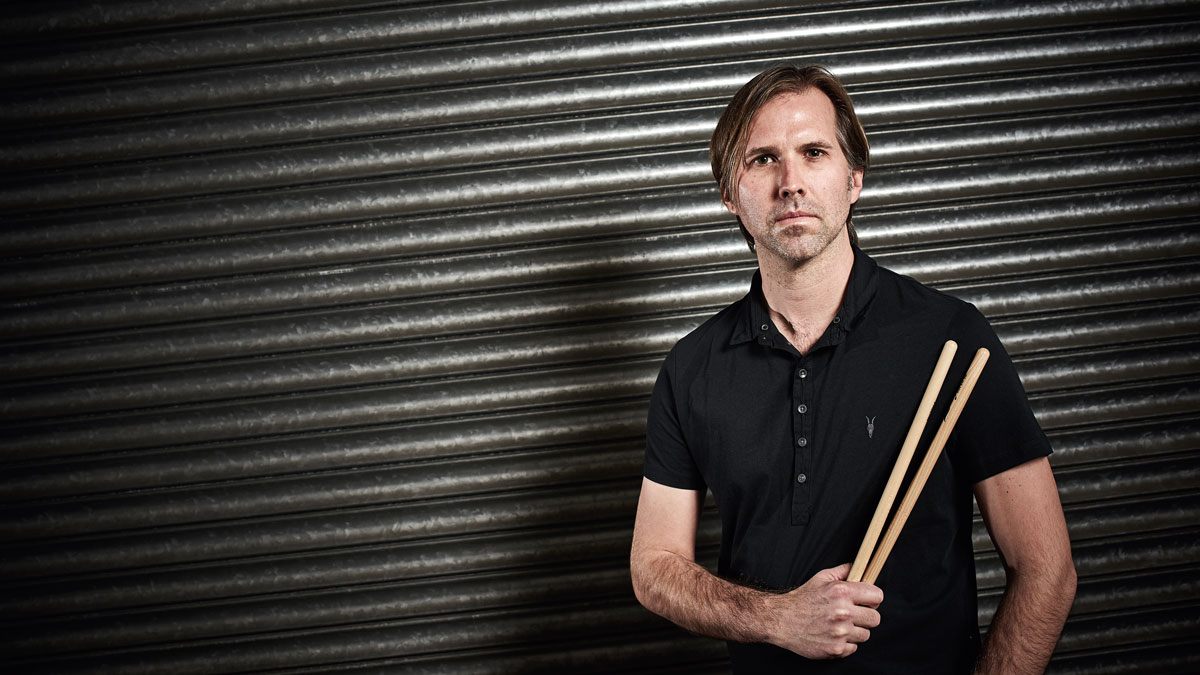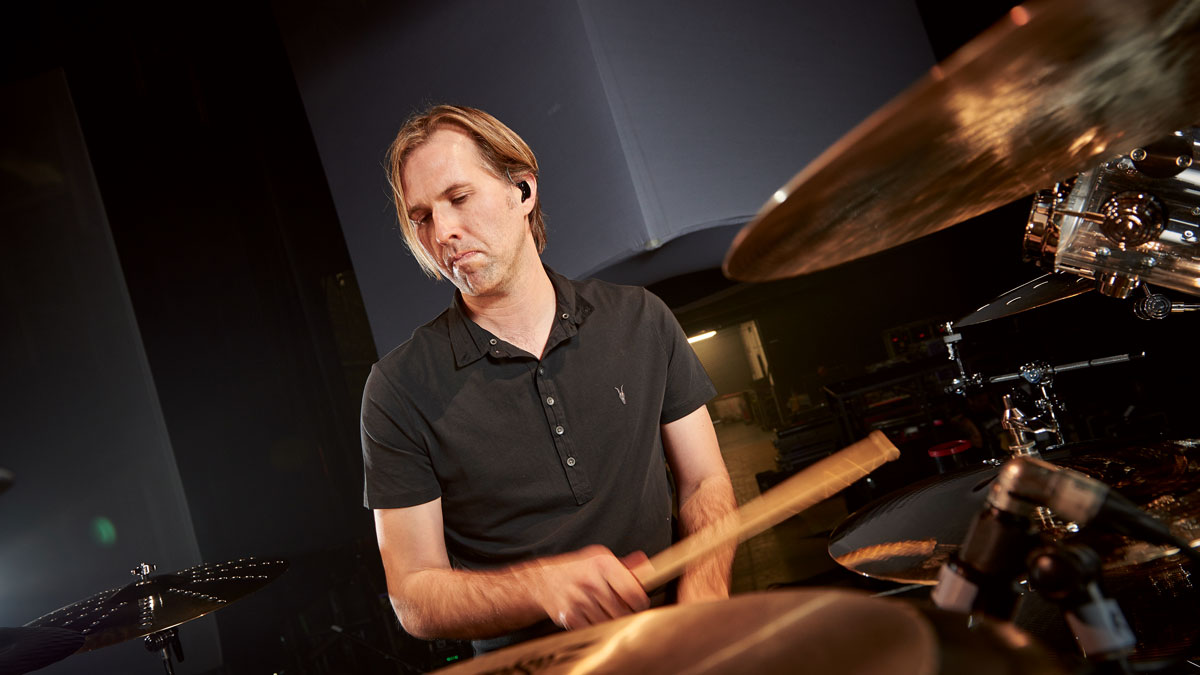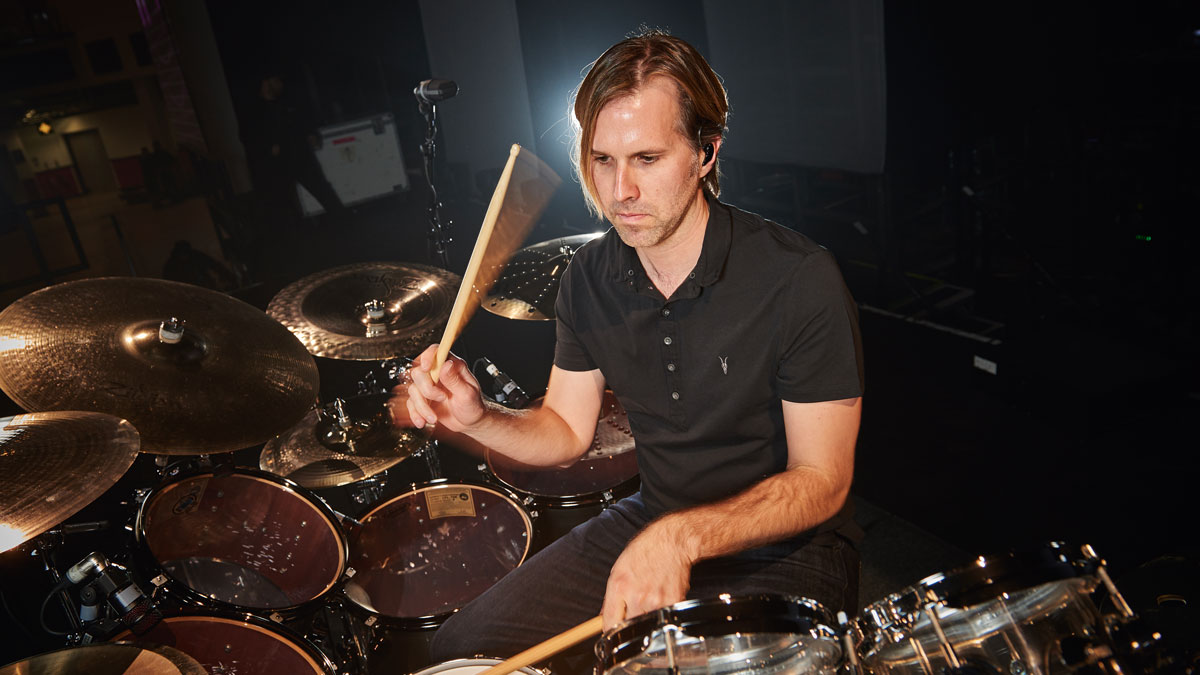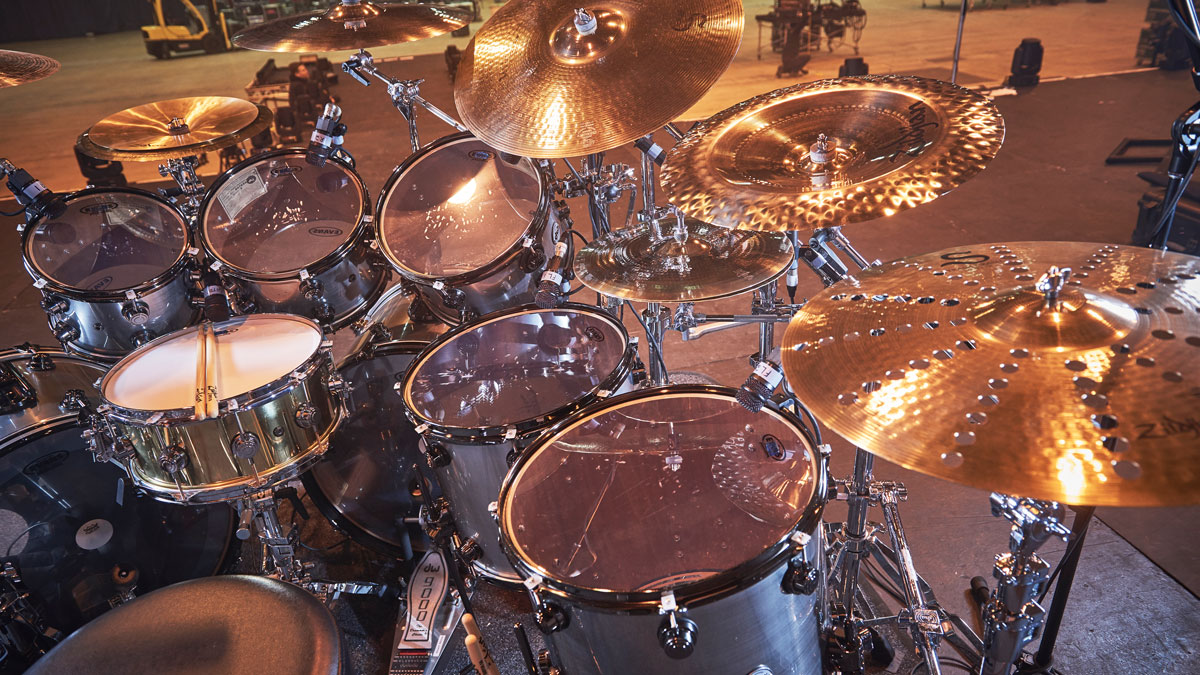Brooks Wackerman on making his mark with metal masters Avenged Sevenfold
Ex-Bad Religion man discusses The Stage

One hell of a pedigree...
There’s a long list of drummers who were born with a natural rhythmic ability.
For Brooks Wackerman, drumming was literally in his blood. Not only is his father Chuck a highly respected jazz drummer, but his older brothers John and Chad are celebrated sticksmen too. Chad is best known for his incendiary drumming with Frank Zappa in the ’80s and John has played with artists as diverse as Lindsey Buckingham, Patrick Moraz (Moody Blues) and Japanese guitarist Kazumi Watanabe. Considering his musical DNA, it was unlikely Brooks would become a chef.
Over the last 25 years Brooks has carved out an impressive career, commanding the funk and metal of Infectious Grooves and Suicidal Tendencies, the grandiose comedy rock of Tenacious D, and even sessions with skate-pop princess Avril Lavigne. For 15 years he was also a fully paid-up member of Californian punks Bad Religion.
Following the culmination of the recording and touring cycle for Bad Religion’s 16th album, True North, Brooks found himself at a career crossroads, proud of his achievements, but ready to explore new musical environments. Elsewhere in California, heavy metal virtuosos Avenged Sevenfold were pondering their future too.
Since the untimely death of childhood friend, songwriter and all-round drumming demon Jimmy ‘The Rev’ Sullivan in 2009, the band had struggled to click with a permanent replacement. Mike Portnoy and relative unknown Arin Ilejay were drafted in to perform the difficult task of filling Jimmy’s shoes, recording and touring two subsequent - and highly successful - albums, but the relationships were short-lived.
As you know the drumming [in Avenged Sevenfold] is very detailed, especially Jimmy’s parts, so I had a lot of homework and woodshedding to do leading up to the audition.
Gearing up to write and record album seven, Avenged needed a drummer with the chops, attitude and creativity to match their Metallica-sized ambitions and to push their music to the next level. As it happened, the band’s tour manager was also Brooks’ personal manager.
The planets aligned and, following a successful audition, in 2015 Brooks became a full-time member. The immediate result of this alliance was new album The Stage, a stunning display of metallic virtuosity from each member and further proof that Brooks’ talents go even deeper than his stellar CV would suggest.
We caught up with Brooks in Cardiff during Avenged Sevenfold’s January UK tour to discuss, amongst other things, how much the gig means to him, recording the stage with one of Bonzo’s snares, and how he was able to channel The Rev whilst putting his own stamp on the music.
A new chapter
They say that when a butterfly flaps its wings it sets off a chain of increasingly bigger events. In Brooks’ case, it seems his drumming with Infectious Grooves 23 years ago was the event that set the wheels in motion for his latest gig.
“When I was a teenager I played in [Infectious Grooves],” he recalls. “We released a record called Groove Family Cyco and that was [the Avenged guys’] introduction to my drumming. It’s funny because on the Warped tour in New York we went to an after-party. I stepped outside and was walking back to my hotel and Brian [Synyster Gates] was reciting some lyrics as I was walking past and I didn’t know where it was coming from. He told me years later it was him.
“We did a number of Warped tours together. There’s 40,000 people on that tour so you don’t really get to know people that well, but I definitely respected the band. I respected how different they were and their mindset, and there was really no other band that did what they did on the tour.”
Securing a gig like Avenged Sevenfold is no walk in the park, and before his name could be inked on the album sleeve, Brooks had to prove his skills in a nerve-wracking audition.
“I really wanted to do well and execute the songs,” he remembers. “As you know the drumming [in Avenged Sevenfold] is very detailed, especially Jimmy’s parts, so I had a lot of homework and woodshedding to do leading up to the audition. They gave me five or six songs to learn and study, including Nightmare, Little Piece of Heaven and Bat Country. It definitely ran the gamut of technical drumming and other more feel-based songs to make sure all fronts were covered. Once we started playing, everything fell into place and it clicked.”

“I’ve never walked into a situation like this before...”
The Rev’s shock passing left a huge void in Avenged Sevenfold. Not only was he responsible for anthems including Afterlife and Almost Easy, but the band had been pals since school. Filling those shoes must have had been more emotionally charged than most other gigs?
“I’ve never walked into a situation like this before,” admits Brooks. “I had to study all of his parts and obviously there was some anxiety there trying to really execute them properly. Obviously huge shoes to fill, but I was just honoured that they asked me to be that guy, and carry the torch, but also come up with new parts.”
Between The Rev, Portnoy and Ilejay, Brooks certainly had some tough acts to follow behind the kit, but Avenged Sevenfold weren’t looking for a tribute act. “[The Avenged guys] were very encouraging for me to find my own voice in the band. They welcome that concept. Joining a well-established band like this you never know what the pre-conceived ideas are, but there weren’t any. They just said this is what we do, but be your own guy. Don’t emulate too much and we want a new flavour too. For this band, as a drummer there’s such a wide array of options and new colours on the palette to paint with, so I couldn’t ask for a better bunch of guys to be creative with.”
Electric metal
Before any notes were laid down for the stage, Brooks’ first assignment was to record a track for the Call of Duty: Black Ops III video game. The resulting music, entitled Jade Helm, is an atmospheric, tom-heavy piece, which Brooks performed on a Roland V-drums kit.
“That was the first time I was creatively involved with them. We wrote all that music,” he says, proudly. “Even with Bad Religion, I’ve always demo’d on an electronic drumset, but never released something played on one. For video games that’s what you have to do. Luckily right off the bat we came up with a couple of grooves that seemed to work, so it was a pretty smooth session.”
Brooks’ experiences playing heavier music early in his career certainly helped prepare him for the full metal onslaught of Avenged, but it has been returning to a bigger kit, and the associated creative scope and freedom, that has been the greatest consequence of his new gig:
“Even before I discovered punk rock drumming I had a double-kick set-up, so I was familiar with the feel of two kicks and I was playing a lot of metal in my early teens with different bands. Then I played with Suicidal Tendencies for five years and there was some metal elements there. To go from a five-piece set with Bad Religion to what I’m playing with Avenged has been fun, just to hear different tonalities.
I was practising every day leading up to the record. Even live, there’s songs they’ll call out that I haven’t played before, and Jimmy did a lot of real fast 32nd-note kicks. It’s always a constant work in progress.
“I’ve got the stack cymbals, which I’ve never really messed with. It just opens up a whole new can of worms creatively. Some drum parts, just by having that stack cymbal opened up new possibilities and patterns for me to play with. There’s a song called Higher on the new record that has a cross-stick pattern with the stacks and this not-too-intricate double-bass rhythm. Without that set-up I wouldn’t have been able to create something like that.”
Avenged Sevenfold’s music is awash with energy, particularly The Rev’s busy double bass-drum parts. Having chops is one thing, but the stamina to play for long periods must be essential to staying match fit?
“I was practising every day leading up to the record,” he admits. “Even live, there’s songs they’ll call out that I haven’t played before, and Jimmy did a lot of real fast 32nd-note kicks. It’s always a constant work in progress. If you take a vacation for too long you’ll get rusty. I think Steve Smith calls it ‘maintenance practising’, where even if you have a long period of not playing you should still hit it a few days a week to maintain what you do.”

Style and substance
Avenged Sevenfold’s music isn’t short on notes. In the hands of any other band this would be considered a crime to music, but their standalone style and enormous songs are crafted to perfection. We asked Brooks to elaborate on his approach to creating musical drum parts in such a musical minefield.
“A lot of it has to do with phrasing,” he offers. “There’s a lot of notes in this band for a drummer to exercise. That’s always a battle, a tug of war between ‘Should I play this many notes for four bars, or should I let it breathe’? Usually it’s more ferocity than less-is-more. It’s how you write or improvise the part. If it’s against the guitar solo you have to find spaces where you’re not interfering with the guitar solo; finding the sweet spot. On a song like Exist, the last song on the record, I spent a lot of time trying to craft what works and what doesn’t work. Once I heard it in the studio I had a pretty good idea of what I sculpt out. That was kind of a science project.”
I really enjoy playing God Damn. There’s a lot of peaks and valleys in that song. The main groove on the feet took some time to get right.
Whatever the approach, there are plenty of standout drum moments on the stage, particularly the tom/snare verse groove on Paradigm. “‘Paradigm’ is a good example,” he considers. “Everything came together in an hour. I had that groove fresh in my head. We went to Brian’s house; that’s where we demo’d all the songs. I started playing that groove and he came up with the guitar riff.
“I really enjoy playing God Damn. There’s a lot of peaks and valleys in that song. The main groove on the feet took some time to get right. The snare on the ‘2’ and ‘4’ felt weird to me at first. The song Higher was a pattern that I had for a while that I was toying with. I thought it was a little too weird to put on the record. I’ve never written a part where I was playing a double-kick pattern against a cross-stick, but I thought sonically it was interesting.”
With the songwriting nailed, another key element for Brooks was nailing his drum sound to give the songs the punch they deserved. He opted for the trusty DW cherry mahogany kit he’d played for many years with Bad Religion. An extra tom, a second bass drum and an embarrassment of cymbals later and he was almost ready to go. But he didn’t quite stop there.
My brother is friends with Jeff Ocheltree who was Bonham’s tech. He loaned me the actual snare drum that John played on In Through The Out Door. That was a beast.
During the Stage sessions Brooks sprinkled some additional magic courtesy of a particularly special snare. “One of the snares on half the record is a steel Ludwig 402 Supra Phonic. My brother is friends with Jeff Ocheltree who was Bonham’s tech. He loaned me the actual snare drum that John played on In Through The Out Door. That was a beast. We also used this real thick piccolo with vents in the shell - it kind of had this marching band effect to it.”
Where punk drummers typically go for smaller kits, Brooks has always been a fan of a bigger set-up, for good reason. “I’ve always had two floor toms,” he confirms. “With Bad Religion it was one rack, two floors and maybe four or five cymbals. I guess I’ve always leaned towards more toms than not, just to get that spectrum of sound and disparity between toms. I come up with different patterns when I have different sizes out there. The kit that I’m playing tonight has been an evolution. Before the record I just had two toms up and two crashes coming out of my bass drum. We decided I needed a third tom to round it out.”

"I like high-pitched snares, but with a lot of body."
The new gig requires plenty of attack and clarity from the drums, and there are no triggers on the kit, so tuning, head choice and a good sound man are key:
“We have an amazing sound guy named ‘Shirt’. He’s the same guy that works with Slipknot too. He knows, especially on the faster songs, how to get the most punch on the kit. The first time I worked with him we spent a few hours at soundcheck to get the right heads, the right muffling.
“I don’t use too much, just two DW pillows fairly close to the batter head. Moon Gel is very minimal, just so the drum sings. I use the nylon patches on both kicks. DW just came out with these all-wood beaters. It comes with a soft cover but we take that off and it’s a wooden beater underneath. They also feel lighter than the regular DW beaters so you can fly on them pretty fast.
“I’m using a 14"x6.5" brass snare, and we crank it fairly high,” he continues. “A couple of nights ago it was tuned a little too high so we had to bring it down to find that sweet spot. I like high-pitched snares, but with a lot of body. I think once you lose the body it just sounds choked, so to me the perfect snare drum is a hybrid of those two sounds. With the toms I like to have disparity between those tom sizes, so you distinguish the 10" from the 12", the 13" from the 15", to the 16", so they all have their own voices.”
Stage fright
On the UK tour Avenged singer M Shadows (Matt Sanders) decided to introduce a drum solo slot with the new guy. It started off as an impromptu request, but has become a regular fixture. Generally a quiet, unassuming character, how does Brooks feel about the limelight, and does he enjoy soloing?
“[The first time I was asked to solo with Avenged] I just started playing what was on top of my head. After that night we’ve been doing it randomly. I think Matt was making fun of one of my endings on Bat Country. I don’t really have conventional endings, they kind of sound like tourette’s. Maybe it’s the art student in me. I’ll do a minute or two of off-the-cuff noodling, and hopefully I’ll land with both feet on the ground. I started doing drum solos live with Tenacious D. At the end of the show Jack [Black] would have the whole band do individual solos. At high school I played in jazz band so I always had a drum solo whenever we had competitions.” It’s always the quiet ones...
Brooks ponders being a full-time member of Avenged Sevenfold, and how personally significant it is to have a place to lay his sticks long-term.
“I’ve done some big tours. I sat in for Travis on the Blink tour in Australia [in 2013] and I’ve done some really big Tenacious D tours with huge productions, but I’ve never been on a tour where I’m a band member and I have creative input. To me it means a lot more and I value it more because I’m part of a record that I’ve put my heart and soul into. I love that on day one I was a part of what we’re promoting right now. We went through a lot of steps to get here. Everyone in this band takes their instrument very seriously, and they all can play so that inspires me to want to do a better job every night. It’s definitely a musician’s band which is something I’ve been craving.”
I'm MusicRadar's eCommerce Editor. In addition to testing the latest music gear, with a particular focus on electronic drums, it's my job to manage the 300+ buyer's guides on MusicRadar and help musicians find the right gear for them at the best prices. I dabble with guitar, but my main instrument is the drums, which I have been playing for 24 years. I've been a part of the music gear industry for 20 years, including 7 years as Editor of the UK's best-selling drum magazine Rhythm, and 5 years as a freelance music writer, during which time I worked with the world's biggest instrument brands including Roland, Boss, Laney and Natal.
